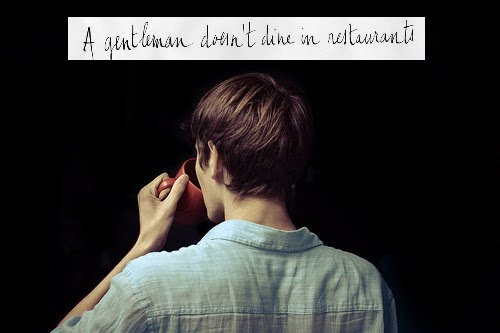Aye, and poets send out
the sick spirit to green
pastures, like lame hor-
ses turned out unshod to
the turf to renew their
hoofs. A sort of yarb-
doctors in their way, po-
ets have it that for sore
hearts, as for sore lungs,
nature is the grand cure.
But who froze to death my
teamster on the prairie?
And who made an idiot of
Peter the Will Boy?
I was at breakfast yesterday
with a learned and accomplish-
ed couple of my acquaintance
of the past dozen years or so,
and in exchanging good news of
what we're reading, Crawford's
biography of Eliot (up to the
publication of The Waste Land)
came up, as would be normal.
It turns out, they hadn't read
the poem yet, but insofar as I
had paid it serious attention
(within my usual limits) only
in very recent years, I hold
no scorn for this revelation,
only the profoundest excite-
ment for their sake, to have
reserved that extraordinary
experience. They go all over
the world, they do whatever
they want (they are young),
and they're acutely alert in-
dividuals. I did mention the
usual assurance, that if they
had heard any Dylan (or heavy
metal or Alban Berg), they'd
been standing at the starting
gate long enough, to let them-
selves go; and in any good edi-
tion (I like the one cited be-
low), footnotes and the like
would look after them - not,
in any musical sense, that
they're needed.
As they then joined his fam-
ily, to see an afternoon of
Star Wars, I went looking for
a decent edition for them, on-
ly to find there wasn't one
in town. By "town," I mean
the site of the university
Jefferson designed for our
illumination, not far from
his own house. Of course,
the library must hold a copy,
and probably it is available
for nothing online.
We all do live with this poem;
but not to know it, is peculi-
ar. As our conversation over
the division of coffees and
pastries had ranged over read-
ings in poetry, in general, so
I opened a new volume from a
poet cited here before, scan-
ned some lines which could
have come only from Mark Doty,
and realized, much was going
on in them that would not be
there without The Waste Land.
With great regard for a poet
I will always read, and usu-
ally with gratitude (some,
morally obligatory), I sug-
gest he has deeply imbibed
Eliot's praise of Chaucer's
nostalgic sense, of April -
April is the cruellest month ..
We began to think the white fish individual
- the one of the pair who'd struggled, after all,
when our pond's cold water shocked
and he lay pulsing in the shallows
till we thought him all but gone ...
Then simply he drew himself up,
if that were something a fish
could do, and swam away.
A heron ate his mate.
He surfaced in March,
after his first season
entombed in the bottom mud,
unscathed, a four-inch emperor
in his white silk coat,
insignia of the kingdom
splashed over his back
the color of candied orange rind.
He'd nose up out of the lily-murk
when our shadows crossed his borders,
push to the edge to open the translucent
white ring of his mouth over and over
as if begging ... As if! Seems to want,
seems to feel. But as we knew him
semblance fell away: We felt the presence
of the soul of him, if soul could be
understood as specificity,
so that when he himself was swallowed
- white appetite perched on the roof,
bill raised to the air, the throat unrelenting -
the absence in the pond grew resonant,
a sort of empty ringing. Where were the details then,
the gestures that had marked him?
...
Herman Melville
The Confidence-Man
His Masquerade
1857
Cited in:
John Williams
Butcher's Crossing
1960
New York Review Books, 2007©
Robert Crawford
Young Eliot
From St Louis to
The Waste Land
Farrar, Straus & Giroux, 2015©
T.S. Eliot
The Waste Land
I, i
1922
Michael North
editor
1951
Norton Critical Edition, 2001©
Mark Doty
Deep Lane
Poems
Deep Lane iii
[fragment]
Norton, 2015©


















